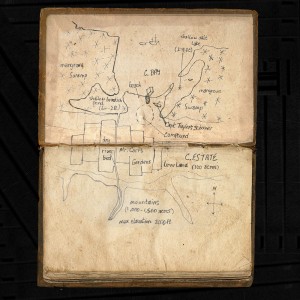The curious moving parts of Robert Antoni’s multi-media novel, As Flies to Whatless Boys, functions—perhaps with a dash of mischievous intent—akin to one of its characters J.A. Etzler’s machines. Throughout the novel, Etzler—a utopian socialist with cred backed by Brooklyn-bridger Roebling, civilly disobedient Walden writer Thoreau, and comrade social-dreamer Fourier—attempts to sell shares in his various machinic exploration adventures, the results of which are uneven. The novel’s wings, of course, span much further than Etzler’s propelled mishaps, but its accompanying online presence could benefit from a much more audacious, interwoven series of videos, archives, music, artworks, and diagrams. I was drawn to the evocative book-ended short films the most, and wish several more could have been made to offer, for example, steamy sketches of such characters as Miss Ramsol and Mr. Robot, or even a real-time performance of the punchy Etzler play. Although the decision to include an online element offers some intriguing leaps outside the page like the folded color map (between pgs 152 & 153) offers surprising leaps into the page, Antoni could have taken many more inventive liberties with a blueprint for a new digital Caribbean literature.
On the physical realm, the novel indeed has enough elements to keep the reader busy. The mid-nineteenth century story of Willy’s family traversing the Atlantic, Willy secretly redistributing delicacies to the poor as he learns the craft of love with Marguerite, Etzler and Stollmeyer delivering woeful demos of their brave new instruments, the grand hoodwink of the Tropical Emigration Society selling a journey to nowhere, and the survival race on an island with fever-inducing mosquitos tries to weave, a bit loosely, with the early 21st century one-sided exchange between flirtatious archivist Miss Ramsol and presumably the author-as-character who jooks her for easier access to the Trinidad and Tobago archives that can help research the book we ultimately hold in our hands. Although meant for comedic value, this neo-colonial power-exchange built into furnishing the novel’s historical backdrop can make for uneasy vaults back and forth in time, and may paint Mr. Robot in a similar light as the “pioneers” who come to Chaguabarriga only when they need food, wood, or medicine. We can surely ask the question about how to conduct archivally grounded Caribbean historical fiction writing in a way that wriggles out of these deeply grooved arrangements of “resource extraction.”
Ultimately, the impulse to socio-technologically dream big comes across in the novel as being ethically suspect or a downright failure, while the scrappy new world efforts to make do under scarcity allows for a fairly bleak historical lens of development for us to inherit. To pose another question: how can we envision an “advanced” Caribbean socialism that doesn’t employ such grand unrealizable schemes, repatriation bonds, non-credible news material, and uncertain voyages as those of Etzler and Stollmeyer? Etzler’s sonorous phrase, “We are on the eve of the most eventful moment of humankind,” is as (differently) true today as it was in his emplotted time. What kind of digital Caribbean literature can we make to both represent and shape this time? How can this literary renaissance be combined with movements to equalize social infrastructure in the hemisphere so all can enjoy it? Perhaps that Antoni’s As Flies to Whatless Boys opens up these kinds of inquiries is one of the most promising links on its blueprint.


